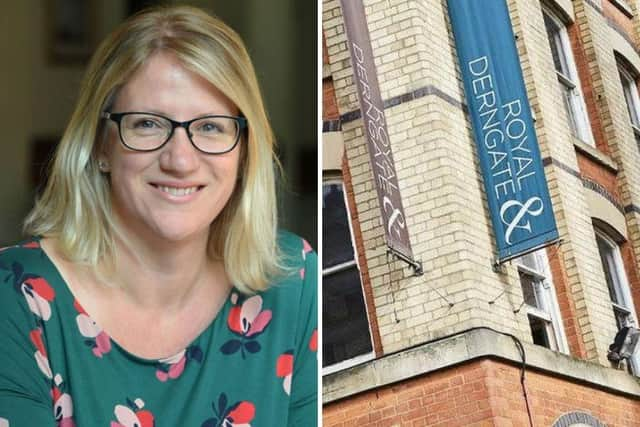CEO shares ‘worrying period’ the Royal & Derngate faced following RAAC discovery when ‘sales took a knock’
and live on Freeview channel 276
The CEO of the Royal & Derngate has shared the “worrying time” the popular theatre faced following the discovery of RAAC in September, when “sales started to tail off” after they reopened.
Advertisement
Hide AdAdvertisement
Hide Ad

“We have got very used to operating really smoothly in the current state,” Jo told Chronicle & Echo. “Even in December we were still learning how best to get audiences through the spaces.
“With panto season and the volume of people, it showed the building can function effectively.”
Audience members have continued to show unwavering support, after being asked by the Royal & Derngate to “come on a journey” with them in navigating the unprecedented changes.
Advertisement
Hide AdAdvertisement
Hide AdThough it was a successful pantomime season, Jo shared that “sales took a knock” throughout the autumn and winter months.
“It’s always a worry when sales start to tail off,” she added. “But panto season exceeded the number of people from the year before.”
Jo was asked – four months on from when both the Royal and Derngate auditoriums reopened – to sum up the impact the closure has had on the venue’s finances.
She said: “It was a worrying period. We had to reschedule a number of shows and make refunds for the shows we could not deliver. It wasn’t a great position to be in.”
Advertisement
Hide AdAdvertisement
Hide AdOne show, which was produced and put together by the Royal & Derngate, is now on tour across the country.
However, as it was unable to be performed on the Derngate stage because of the issues with RAAC, the venue missed out on these ticket sales – and they would have got 100 percent of the money as it was produced there.
Though most people have proceeded to host events at the Royal & Derngate, Jo shared that some have decided not to because of “how the theatre looks and feels”.
“It can all have a big impact on our budget,” said Jo. “We’ve had to think creatively about how we can save the offset.”
Advertisement
Hide AdAdvertisement
Hide AdBookings for spring are looking “really positive” and the CEO believes it is about “reassuring audience members that the experience is going to be great”.
Their main focus for 2024 is to resume the celebration of the Derngate turning 40, which came to a halt when the RAAC was discovered.
This message from Jo about the importance of supporting the Royal & Derngate – and the arts as a whole – in 2024 still stands.
“Being entertained is one thing,” said Jo, back in December. “But it can have an impact on your health and wellbeing, and your sense of togetherness. The arts can deliver that in such a special way.
“Supporting local is important in whatever people do, but local theatre is really important. It’s such high quality and a brilliant experience. It goes beyond theatre, to the arts in general.”
